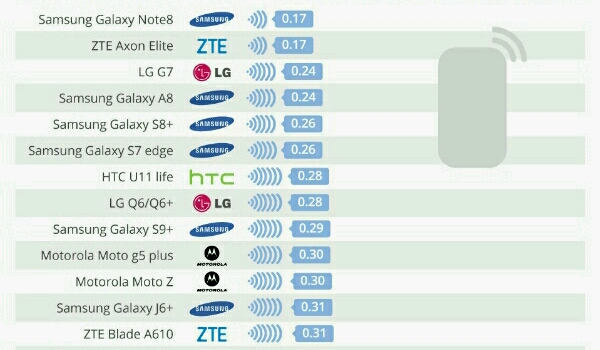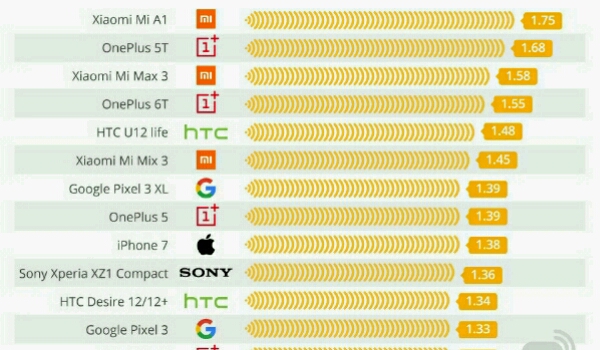Mobile phones have already become an important part of our day to day lives. From academic work, professional work, and also our daily tasks, these gadgets put multiple tools in our hands on a daily basis. Nevertheless, there is nothing perfect, as they have their advantages and disadvantages. One of the side effects of cell phones that do not get talked about regularly among consumers is that of their radiation emissions. All mobile phones emit radiation in the course of transmission. Health authorities warn that users may be affected by these radiation emissions. The keyword is “may”. There are no conclusive results yet on the subject. The German Federal Office for Radiation Protection, Bundesamt für Strahlenschutz, was able to compile useful data which has been used to build smartphone radiation ranking charts. According to the research by the office, Samsung Galaxy Note8 emits the least amount of radiation (0.17 watts per kilogram) of all the cell phones available in the market. Samsung phones show up a lot on the chart of low radiation emitting devices. On the other hand, Apple has quite a number of phones emitting high amount of radiations. The Apple mobile phones that release the highest amount of radiations are iPhone 7 and iPhone 8. Xiaomi Mi A1 tops the list of phones releasing the highest amount of radiations. Right behind it is another mobile phone from China, OnePlus 5T.
Smartphone Radiation Ranking Charts (2019)
Cell phone radiation is measured in SAR. That is, Specific Absorption Rate. The charts below list the lowest and highest radiation emitting smartphones based on their SAR figures.
Phones With The Lowest Radiation Emissions
Phones With The Highest Radiation Emissions
Looking at the charts, it is clearly visible from the data provided that Samsung phones generate very low amount of radiations – about half of the benchmark (0.60) that German authorities use. On the other end, Xiaomi and Apple phones’ emission rates are more than twice the benchmark.
Cheaper Comes At A Cost?
The smartphone radiation ranking charts are a revelation. Who would have thought that Apple iPhones would release such high levels of radiation? And Google Pixels too! And then, those HTC models. Considering how quite a number of lower cost, Chinese, smartphone models made the higher emissions list of this smartphone radiation ranking, one would have been tempted to argue that cheaper phones come at a cost and that higher SAR values is one of them. But with iPhones, Google Pixels, and HTC phones in the picture, that is difficult to argue, even though those budget smartphone brands are prominent on the higher emissions list.
Smartphone Radiation Ranking: Lower Emissions = Better
Talking about low and high levels of radiation, we should take note that there is no particular level which can be considered “safe”. However, the German Certification for environmental friendliness, “Der Blaue Engel”, does certify only mobile phones whose emission rate is lower than 0.60 watts per kilogram. There is controversy over whether smartphone radiation is harmful to health. While the controversies rage on, if you want to be on the safe side, a phone with lower radiation emissions is what you want to use. For now, that would include Samsung and Motorola smartphones in general. ZTE and LG made a good showing as well. Will these smartphone radiation ranking charts affect the sales of these brands? Your guess is as good as ours. It does not appear that many phone users are aware of the issues involved. And even where the awareness exist, it does not appear that too many care.
Sept. 2019 Update: Apple and Samsung phones are investigated by the FCC for emitting too much radiation
The Chicago Tribune published a report on the 21st of August 2019 to say it sponsored independent tests on popular smartphone brands for radio-frequency radiation and reported that certain smartphones from Apple and Samsung emit higher levels of radiation than is allowed by the FCC. The tests were conducted according to federal guidelines at an accredited laboratory. The Tribune reported[3] that “Radiofrequency radiation exposure from the iPhone 7 — one of the most popular smartphones ever sold — measured over the legal safety limit and more than double what Apple reported to federal regulators from its own testing.” The iPhone 7 is listed on the German agency’s smartphone radiation ranking chart as one of those with the highest emissions. So, this is its second mention as a device that emits high radiation. Chicago Tribune says that they tested 11 models from 4 cell phone manufacturers. They include: The first tests were conducted in October 2018 and the results shared with the manufacturers. Both Apple and Motorola disputed the results, saying “they were not done in a way that properly assessed their devices”. The newspaper then re-tested their phones. The Tribune insists that all the tests were conducted “in accordance with FCC rules and guidelines”. In all, Apple iPhone 7, iPhone 8, as well as the Samsung Galaxy S8, Galaxy S9, and Galaxy J3 were all said to emit higher levels of radiation than they’re supposed to. As a result of The Chicago Tribune’s tests and publication, the United States’ Federal Communications Commission is reported to be investigating these phones. If you would like to read details of how the Chicago Tribune’s tests were conducted, click HERE.
How Much Radiation Comes From Phones?
This is a good place to ask the question: How much radiation comes from phones. The answer is easy: not a lot. Cell phone waves occupy a place that is classified as safe along the electromagnetic spectrum. There are much more powerful emissions, and some of them will surprise you. They include infra-red waves, visible light, ultra-violet waves, x-rays, and gamma rays, in that order. Everything below visible light is considered safe. That includes infra-red, mobile phone waves, TV and radio waves. Now, while they are all in the safe zone, tregulatory bodies have to determine how much intensity is considered safe for humans to be exposed to on a regular basis. Why is this if they are safe? Here is an example: light from a flash light is safe. We use it everyday. But if you concentrate it on a spot on your skin, it begins to burn you. Remember the word “intensity”? The visible light from a flashlight burns if it is intense and concentrated enough. Too much of everything is bad. That is the same way harmless cell phone radiation can cause damage. So, regulatory bodies set limits. Everyday use of mobile phones that fall within the limits of regulatory bodies like the FCC are safe to use. Those ones that read above those limits are not necessarily going to harm you, but there is a chance that they do if you are using them non-stop for long periods. The key is that no-one should find out the hard way. References
Don’t miss our reviews.Join our WhatsApp Group, to be notified of the most important articles and deals,Follow us on Instagram, Facebook, Twitter, and YouTube.


